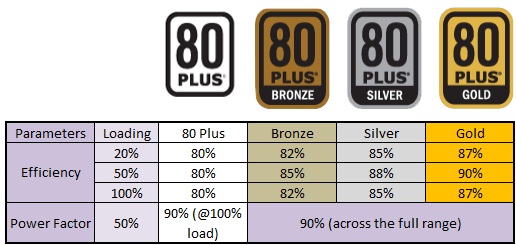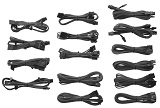 |
 |
 |
 |
 |
 |
 |
 |
| - GPU - | - CPU - |
- SSD - |
- Cases - | - PSU - |
- Coolers - | - Memory - | - Audio - |
Power Supply Reviews by PCWizKid
Gaming rigs these days are becoming more demanding with the latest Nvidia GTX cards and ATI Radeons. The fact that CPU's and GPU's are more overclockable than ever means that systems are drawing more power requirements and the need for speed means your power supply needs to keep up and feed the demand. The PSU is the heart of your PC. Everything depends on it for stability and performance.
Below are a variety of quality power supplies that range from 600 Watts (Mainstream) to 1200 Watts (Extreme) for every persons need and budget. These PSU's have been reviewed by PCWizKid and recommended so rest assured you are getting a quality component. Please note, that all my recommendations are based on the assumption that you are running new hardware with the latest CPU and Video Card models out today. Older PC's from over 5 years ago can work fine with power supplies with lesser wattage.
PCWizKid has put together a video playlist you can scroll through and watch the latest Power Supplies reviewed.
If you are unsure about which one to get, use this as a guide:
- Get a PSU that has multiple 12 volt rails with enough amps on each (Two 12 volt rails are the best, otherwise a strong single 12volt rail) for flexibility and for future expansion as well, better have more power options than being limited. However some PSU's with four 12v rails don't have enough power to deliver, (with less than 15amps per rail) that's why I recommend to keep an eye on the amps specified on each rail so that there are no surprises later down the road. Dont get me wrong, there are terrific single 12v rails PSU's that have a strong 70AMP on it for example.
- If you are running a recent mainstream system with a new video card and CPU you should look for a PSU with a minimum of two +12V rails with @20AMPS on each of them at least. However a PSU with one good 40AMP or higher +12v rail will also suffice for a mainstream PC. Even distribution without sharing much load is best, that's why two good 12volt rails are enough in most cases.
- However if you are running a system with multiple GPU's and are overclocking then get a PSU with the highest AMPS on the 12volt rails since the load balancing of the amps within the +12 volt rails could become a bottle neck if you are planning on overclocking your video cards for example and running them on full load.
- Look for a PSU that also has a large fan for proper cooling, usually 135mm or 140mm fan and a well ventilated PSU will last longer. Since we know that heat is what helps deteriorate PC components overtime, having a large 140mm fan in a PSU is not uncommon anymore and should be something you should have.
- For power efficieny you want to look for the 80+ GOLD rating, to me thats the best bang for efficiency and a work horse that should last longer under more usage.
The basic 80 Plus rating means that the PSU is rated for aproximately 80% efficiency at 20% load, 50% load, and 100% load.
The 80 Plus Bronze rating means that the PSU is rated for aproximately 82% efficiency at 20% load, 85% at 50% load, and 82% at 100% load.
The 80 Plus Silver rating means that the PSU is rated for aproximately 85% efficiency at 20% load, 88% at 50% load, and 85% at 100% load.
The 80 Plus Gold rating meas that the PSU is rated for aproximately 87% efficiency at 20% load, 90% at 50% load, and 87% at 100% load.
The 80 Plus Platinum(bet you didn't know there was a Platinum) rating means that the PSU is rated for aproximately 90% efficiency at 20% load, 92% at 50% load, and 89% at 100% load.
- Another not so obvious requirement for some people is to have a PSU that is modular, less clutter and cables that you do not need can be kept in the box for later use. This not only keeps your case interior looking cleaner for cable managment but can also facilitate air flow.
- Lastly, make sure you get a good warranty on the PSU, many manufacturers are now providing 10 years warranty.
